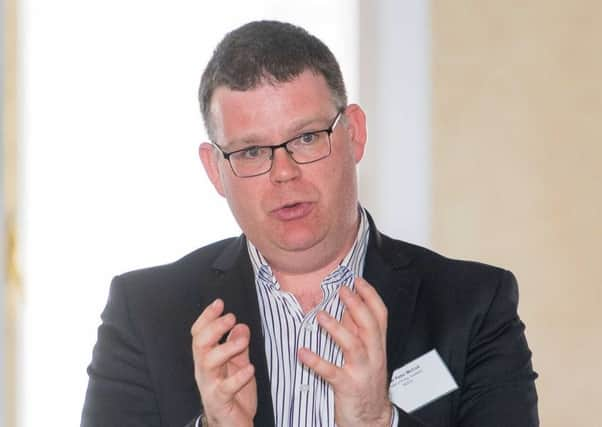Peter McColl: Join in our Grand Challenges to help find answers for our future


In the 18th century, people with an interest in the world came together to share their learning. They did so in societies that shared insights about the economy, industry, the human condition, and, perhaps most importantly, the natural world. These societies drove the first Enlightenment – when the West came to understand the world in new, scientific ways. They were able to apply those ideas to eradicate disease, increase human lifespans, and create new ways of sharing those understandings.
Scotland led this process with vital work in economics by Adam Smith, geology by James Hutton, literary criticism by James Tait Black, and chemistry by Joseph Black. Many of their portraits adorn the walls of Scotland’s national academy, The Royal Society of Edinburgh, where they met to discuss how they could make this knowledge useful. The urban form of Scottish cities, with people living cheek by jowl with their neighbours, did much to facilitate the exchange of ideas.
Advertisement
Hide AdAdvertisement
Hide AdWith developments in data and computing, the need to decarbonise our economy and to adapt to the emerging science around the human genome, we are on the cusp of another Enlightenment. Some like to claim that Scots invented the modern world. That is perhaps overstated, but we must build on the excellence of our research community, found in some of the world’s finest universities.
We also need to harness the dynamism of our start-up scene, the creativity of our artists, and the unique scale of our civil society to build a contribution to the world that compares with that of the first Scottish Enlightenment. Where the tenements of Edinburgh and Glasgow created the perfect conditions for the exchange of ideas, so contemporary Scotland is the perfect size to lead a new Enlightenment.
The first Enlightenment created different disciplines with distinct ways of seeing the world. That was a great strength. But now we need to move beyond those boundaries. In the Young Academy of Scotland we are using a challenges framework to draw insights from different disciplines together and create solutions. We hope it can be a new way to make knowledge useful.
The Young Academy of Scotland is the Royal Society of Edinburgh’s section for people in their early and mid-careers who want to take on the vital task of addressing the grand challenges of our time, to make a difference to a Scottish society. Many of us are university academics, but we also have members who are teachers, entrepreneurs, artists, independent researchers and members who work for charities and voluntary sector organisations. And we’re recruiting!
We are developing a new strategy based on bringing our skills and knowledge to bear on a series of Grand Challenges. If you want to join us, we would love to hear from you. Our challenges build on the work the Young Academy has done since its foundation in 2011. This has covered a wide range of activities, reflecting the interests of our members. Some of our most exciting projects have focused on bringing insight to the public debate. Projects like Research the Headlines bring scientific insight to media reports. Our Responsible Debate project is creating a charter to inform and guide the way we discuss things together, particularly online and around contentious issues.
The Young Academy welcomes applications from refugee and asylum seekers who are involved in civil society. One of these members has helped to set up Mosul Book Bridge, a project to rebuild the library at Mosul University that was destroyed by Islamic State. Others have done important work assisting refugee integration into Scottish society.
Our Grand Challenges aim to address the most significant issues of the day. We want to create a society where collective decisions are made based on evidence and constructive discussion. We also want to ensure that Scotland has net-zero carbon emissions before 2045. We want to increase Scotland’s positive role in the world, so we can share our universal human rights-based approach – a direct inheritance from the first Enlightenment.
We want to end health inequalities on the basis of income, gender, sexuality, race, disability, age and sex. We will do this by developing our work on improving the experience of death, menstruation, miscarriage, obesity and physical and mental health. We want to translate Scotland’s excellent curiosity-led research into social and economic impact.
Advertisement
Hide AdAdvertisement
Hide AdWe will be working with our new members to refine how we tackle these challenges. We won’t solve them by ourselves, but we will reach out to communities and institutions across Scotland and beyond to join us in tackling these Grand Challenges and hopefully contributing to the new Enlightenment.
Peter McColl, member of the RSE Young Academy of Scotland